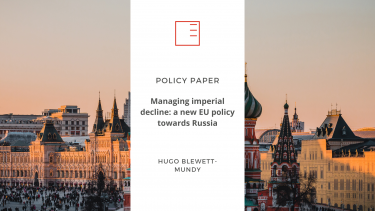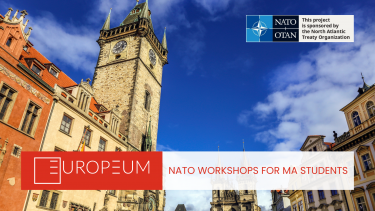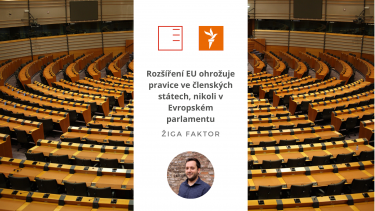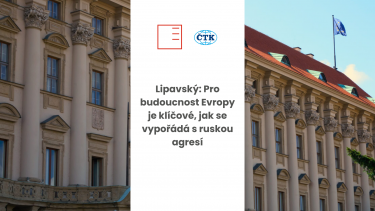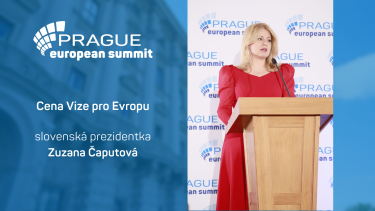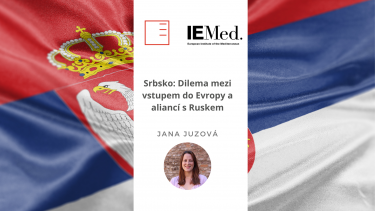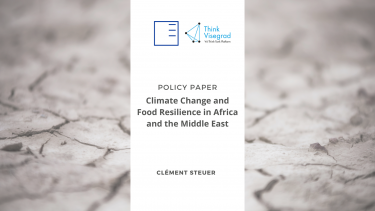Policy paper | Managing imperial decline: a new EU policy towards Russia
Russia's full-scale invasion of Ukraine in February 2022 has shattered the post-Cold War international order built upon East-West interdependence and cooperation. The European Union (EU) - which had tried to pursue a strategic relationship with Russia after the collapse of the Soviet Union in 1991 - must now adapt to the geopolitical reality of Russian neo-revisionism. Hugo Blewett-Mundy, an Associate Research Fellow at EUROPEUM Institute, identifies four areas where the EU's policy towards Russia could evolve to confront this emerging security situation in Europe.
Zjistit víceCall for Participants: Euro-Atlantic Future of Ukraine and Eastern Europe: Views from Visegrad
Are you a Master’s student from the Czech Republic, Hungary, Poland, Slovakia keen on international relations and NATO's strategic future? Join our workshop series to engage with experts, present your views on NATO’s Open-Door policy, and network with peers from the region.
Zjistit více
Radio Free Europe | EU Enlargement is threated by the far right parties in Member States, not in the European Parliament
Even thought parties belonging to the far right achieved good results in the European elections, their growth was not enough to have a major impact on politics in the future European Parliament. What developments can we anticipate with regard to the policy of enlargement of the EU after the elections? Žiga Faktor, deputy director and head of EUROPEUM Institute's Brussels office, comments on the situation for Serbia's Radio Free Europe.
Zjistit více
ČTK | Lipavský: Dealing with Russian aggression is key for the future of Europe
According to Minister of Foreign Affairs Jan Lipavský, it is crucial for the future of Europe how it deals with Russia's brutal aggression towards Ukraine and its increasingly aggressive stance towards the West. He also emphasized that it will be essential for the European Union to ambitiously strengthen its role as a global player in the coming period, including prompt action in the development of the defense industry. He presented this vision in his speech at the Prague European Summit co-organized by EUROPEUM Institute and the Institute of International Relations.
Zjistit vícePrague European Summit | Slovak President Čaputová warned against the rise of extremism and hatred on social media
Slovak President Zuzana Čaputová was the guest of honour at the 10th anniversary Prague European Summit. At the Czernin Palace, she received the traditional Vision for Europe Award from the Czech Minister of Foreign Affairs Jan Lipavský.
Zjistit víceIEMED | Serbia: The Dilemma between European Accession and Alliance with Russia
With Ukraine’s defence against Russia heading toward a stalemate in the second half of the year and increased pressure inside the EU to deliver on its promises to provide the country with needed financial and military support, Serbia’s ambiguous relationship with Russia and the West has been brought increasingly into the spotlight in 2023. The Serbian Progressive Party (SNS), ruling since 2012, and President Aleksandar Vučić have been responsible for continued democratic backsliding and have failed to align with the Union’s foreign policy during Serbia’s lengthy EU accession process, pushing the situation closer towards a tipping point in Serbia-EU relations. Senior researcher at EUROPEUM Institute, Jana Juzová, describes this in more detail in her article for the European Institute of the Mediterranean.
Zjistit vícePolicy Paper | Climate Change and Food Resilience in Africa and the Middle East
Russia's war in Ukraine has destabilised supply chains and strained food systems in Africa and the Middle East, highlighting their vulnerability and the need to increase their resilience. Writes Clément Steuer, Senior Research Fellow at the Institute of International Relations Prague.
Zjistit víceTN.cz | Report on the EU internal market has a huge importance for Czechia
During the recent summit, politicians came to discuss key issues regarding the situation in Ukraine, the Middle East, relations with Turkey, and the competitiveness of the European Union against the United States and China. Executive Director of the EUROPEUM Institute, Martin Vokálek, provided commentary for TN.cz. According to him, it is crucial for Czech politicians and diplomats to be actively engaged in these discussions.
Zjistit více
REPORT | EU-Pacific Talks | Global Race in Emerging Technologies: Lessons for EU-Pacific Cooperation
In the next debate of the EU-Pacific Talks series, hosted by EUROPEUM Institute for European Policy, the guests explored the relationship between cooperation and competition in overcoming technological frontiers in the context of pressing climate and industrial demands. Guests explored insights on fostering technological innovation, tackling climate change and promoting sustainable development. Read what our guests discussed in the report written by Simona Růžičková.
Zjistit víceRTVS | Extraordinary Summit in Brussels
The extraordinary summit in Brussels is focusing on competitiveness and the EU's strategic agenda, including the strengthening of the single market, Turkey-EU relations, Ukraine and Israel. Žiga Faktor, head of the Brussels office and deputy director of EUROPEUM Institute, commented on this for Slovak RTVS.
Zjistit více
Staroměstské náměstí 4/1
Praha 1 - Staré Město
110 00
tel.: +420 212 246 552
email: europeum@europeum.org
https://www.europeum.org
